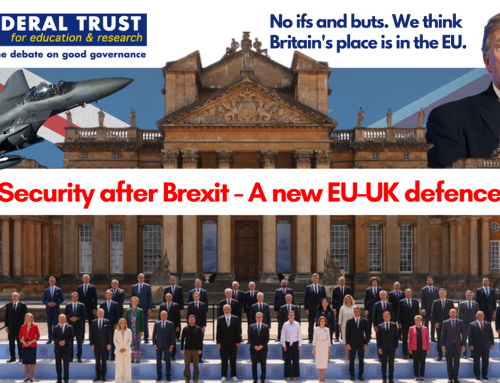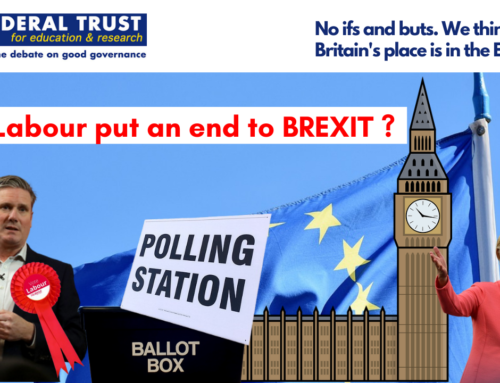Basis for a Speech of Sir Brian Unwin to the Anglo-Netherlands Society, 18 November, 2016
I have chosen as the title of my talk “Does Brexit mean Brexit?”. I wish to explore further the Prime Minister’s repeated but uninformative tautology of “Brexit means Brexit”. Was the 23 June referendum the last word on our membership of the European Union (EU), or is there still an opportunity for the British people to think – and vote – again?
I want to register three main points. The first is about the referendum itself. There is no established constitutional doctrine in this country on referendums. This partly reflects, of course, the absence of a written constitution. In this case, however, there are many reasons why it would be reasonable and entirely democratic to revisit the 23 June outcome. The referendum was advisory, not legally binding on Parliament, and there are perfectly respectable precedents in several other European democracies for revisiting, and even reversing, referendum results, The vote was not, as many claim, a “very clear” victory in favour of quitting the EU. On the contrary it was a very close result, with a difference of fewer than 4 percentage points between the leavers and remainers, and only 37% of the qualifying electorate voting in favour of leaving. Although the remain side overstated some of their forecasts of the immediate economic damage that Brexit would cause, the Leave side were shamelessly guilty of gross misrepresentation and even downright falsehoods about the benefits Brexit would bring (such as the £350 million that would become available monthly to spend on the NHS and the vast influx of Turkish immigrants after their early accession to the EU ). Finally, and most important, no indication whatsoever was given of what economic and other relationships with the EU and the rest of the world could be expected to follow Brexit. Indeed, nearly six months after the referendum we are still waiting to hear what the government’s post-Brexit strategy is. Every indication suggests that the government and Whitehall have no strategy and remain in a complete state of confusion.
I said that there is no constitutional doctrine on referendums. The nearest guidance I have found in recent times is in fact in statements by a senior government minister in a debate in Parliament in November 2002 on the 2nd reading of the Bill to establish regional assemblies in England. Among other things he said:
“In a democracy voters have to know what they are voting for. They need to know what the choice is. For that the proposition has to come before the vote……
There is a proper role for referendums in constitutional change, but only if done properly. If it is not done properly, it can be a dangerous tool…..
A referendum should be held when the electorate are in the best possible position to make a judgement. They should be held when people can view all the arguments for and against and when people know exactly what they are getting”.
I agree entirely with these sentiments. They were uttered by Mr David Davis, the current Secretary of State for taking us out of the EU. I rest my case. None of his requirements were satisfied in the June referendum. We have no idea what we “are getting”. There is therefore a strong case for inviting both Parliament and the people to vote again when we know at least the shape of the trading and other arrangements that can be expected to emerge from the government’s Brexit negotiations. The High Court has already given the welcome judgment that Parliament must be involved in the procedure to activate Article 50. I hope the Supreme Court will uphold that judgement.
My second point is about the economic consequences of Brexit. The data are mixed so far and in some respects the economy, helped by the Bank of England’s intervention, and a splurge of spending by visitors in the run-up to Christmas as a result of the weak pound, has fared better than some had predicted. Economic forecasting is a very uncertain art and subject to large margins of error, but the general consensus of official and most other forecasters is that the outlook for the period ahead – and remember that Brexit has not yet happened – is distinctly gloomy. Growth is expected to decline in 2017 to not much more than 1%. The current account deficit – the amount we borrow from the rest of the world – is at present an alarming 6% of GDP and getting worse, and there is little sign yet of any sustained export boom. At o0ne stage sterling had lost some16% in value against the US dollar and the euro, and the resultant increase in import prices will undoubtedly stoke up inflation – possibly to nearly 4% in 2017 – which means that, as earnings stagnate and benefit cuts begin to bite, disposable incomes, especially among poorer households, will fall. The threat to our financial services industry, which is a major contributor to GDP, exports and total tax yield, is particularly dire unless we negotiate arrangements which provide the necessary continued access to the single market and “passport” to operating within the EU. And finally, as a result of all the uncertainties, investment is likely seriously to decline. A recent survey of manufacturers revealed that already investment plans of some £65 billion have been abandoned.
On the question of investment, essential for growth, jobs and productivity, and where our record is already very poor, I am particularly concerned at the potential loss of preferential funding from the European Investment Bank (EIB) if, as a result of leaving the EU, we cease to be a member and shareholder of the EIB. The EIB is the world’s largest multilateral lending institution and has played a massive part in financing infrastructure and other capital projects in Britain and throughout Europe over many decades. In 2015 it committed loans of some 8 billion euros to infrastructure and other projects (including hospitals and schools) in the UK, stimulating more than double that amount in actual investment expenditure. The same consideration also applies to the subsidiary of the EIB, the European Investment Fund (EIF), Europe’s largest provider of venture capital, of which the UK is a major beneficiary. To cut ourselves off from these two vital sources of investment finance in current circumstances really is shooting ourselves in the foot.
My third and last point is a much broader one – almost a moral one. The world is in a dreadful mess. The Arab world is in flames. We face the biggest refugee crisis since the second World War. Mr Putin is aggressively seeking to re-establish the lawless imperial autocracy of the Tsars. China is growing apace in economic and military muscle and its future direction of policy is uncertain. And to cap it all we now have the prospect of a Trump presidency in the United States which could embrace protectionism and tariff wars, putting an end to the present era of global liberal trading; abandon NATO; abrogate the Paris Treaty on Climate Change; and give encouragement to all the little right wing Trumps now seeking to gather popular support in France, Germany, Austria, the Netherlands, Denmark, Poland, Hungary and other European countries.
In such circumstances it is surely madness for the UK to be seeking to tear both its own Union and the EU apart by leaving the EU. Despite the many differences we have with the EU, and the many political, structural, governance and economic problems that the EU faces, we still all broadly share the same values of the rule of law, respect for human rights, liberal parliamentary democracy and protection of the environment. Surely, if only out of sheer self- interest, we should remain within the EU, working constructively with our partners to maintain and promote these values, rather than pursuing a course that could destroy both our own Union and the EU and lead to an almost certainly poorer and more hazardous future. I fervently hope, therefore, that as the future risks and dangers to both ourselves and the wider world become clearer, the British people will be given the opportunity to vote again, and that Brexit will no longer necessarily mean Brexit. We must not assume that the Rubicon has yet been crossed.




